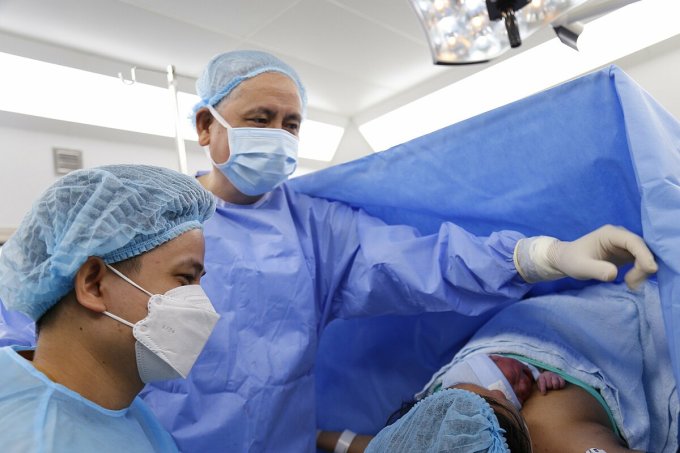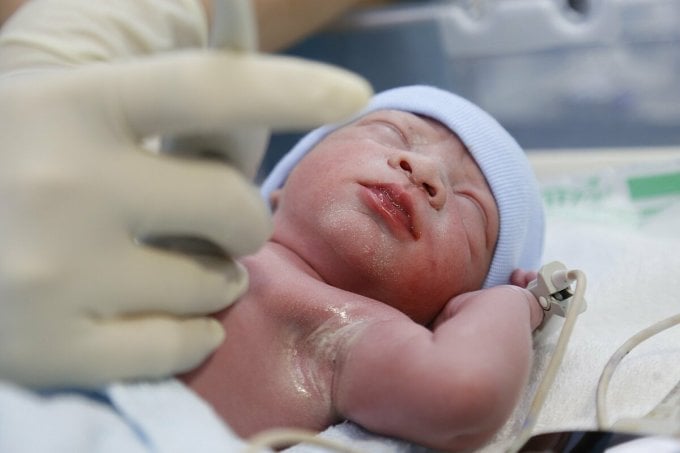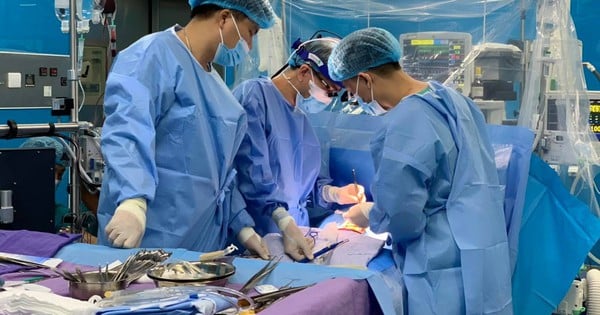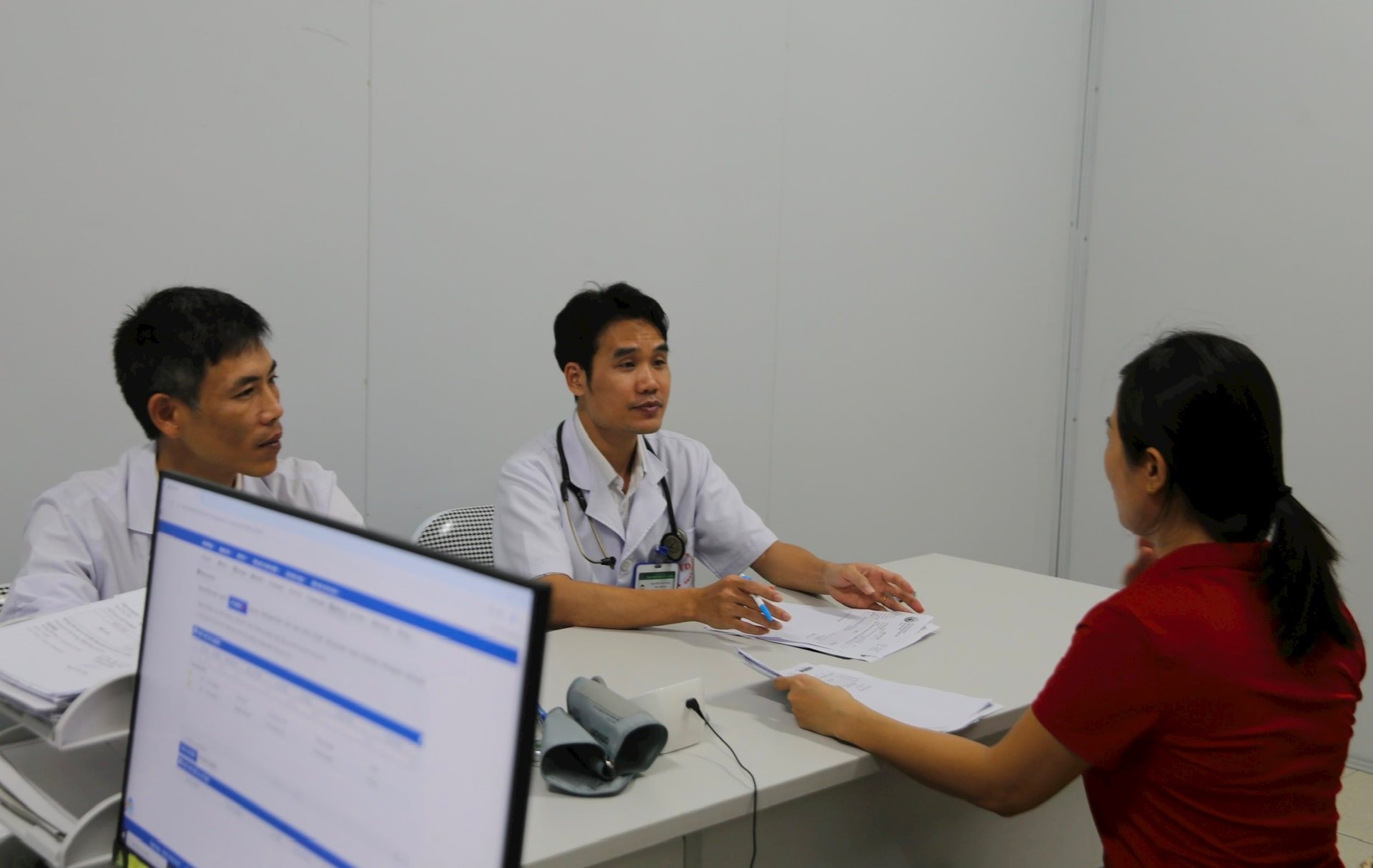Ho Chi Minh City After 4 weeks of the first fetal heart intervention in Vietnam, a 2.9 kg baby boy cried loudly when he was born at Tu Du Hospital, without needing respiratory support as expected.
On the morning of January 30, Dr. Tran Ngoc Hai, Director of Tu Du Hospital, who directly performed the cesarean section, said that the mother gave birth at more than 37 weeks of pregnancy and did not need a blood transfusion.
"The baby's loud cry made the whole crew burst into tears, it was spectacular beyond expectations," said the doctor.

The baby is placed skin-to-skin on the mother's chest in the delivery room. Photo: Provided by the hospital
According to Dr. Nguyen Thi Thanh Huong, Deputy Director of Children's Hospital 1, the neonatal resuscitation team of the two hospitals coordinated to receive the baby and assess his health condition immediately after birth. Initially, the team thought that the baby would need oxygen immediately after birth, but the baby cried loudly when he was born, was rosy-cheeked, and breathed air on his own.
The baby's heart ultrasound directly in the operating room recorded good blood flow through the stenosis. Normally, fetuses with severe pulmonary valve stenosis like this case, if not treated with intrauterine valvuloplasty, can be born cyanotic and have difficulty breathing.
"Seeing the mother in tears holding her baby in her arms while performing skin-to-skin contact, we are even more motivated to continue performing fetal interventions," said Dr. Huong.
After birth, the baby will be taken to Children's Hospital 1 for doctors to evaluate and check the condition of the heart and plan treatment for congenital heart disease.

The baby was born rosy and healthy, not cyanotic or having difficulty breathing as feared. Photo: Provided by the hospital
This is one of the first two fetal cardiac interventions in Vietnam, performed jointly by doctors from Children's Hospital 1 and Tu Du. The other patient is more than 31 weeks pregnant, the fetus is developing well, the cardiovascular condition has improved, and has not worsened. This pregnant woman has been discharged from the hospital to go home for monitoring and regular check-ups.
Fetal intervention brings about very dramatic improvements, but also faces many risks during and after surgery such as hemopericardium, slow heart rate leading to cardiac arrest, premature labor, premature rupture of membranes... However, this technique helps prevent severe progression of the heart, plus the fetus has stem cells that can repair itself, giving the baby a chance to be born healthy.
Director of the Ho Chi Minh City Department of Health Tang Chi Thuong assessed that performing a fetal heart catheterization in the mother's womb is something "few people dare to think about", because the baby's heart is like a strawberry, requiring "absolutely precise technical experience" and coordination between hospitals that few provinces have. This technique has just been nominated for the Vietnam Medical Achievement Award in 2023.
Recently, Minister of Health Dao Hong Lan sent a letter to medical staff at two hospitals, expressing her joy at the success of the first two fetal heart intervention cases in Vietnam. Ms. Lan assessed that this is a very complicated technique, requiring high expertise and coordination, and has only been successfully performed in a few countries with developed specialized health systems. The Minister hopes that doctors will continue to strive to make Vietnam one of the trusted addresses on the world map of fetal congenital heart intervention implementation.
Le Phuong
Source link


![[Photo] Closing of the 11th Conference of the 13th Central Committee of the Communist Party of Vietnam](https://vstatic.vietnam.vn/vietnam/resource/IMAGE/2025/4/12/114b57fe6e9b4814a5ddfacf6dfe5b7f)































![[Photo] Overcoming all difficulties, speeding up construction progress of Hoa Binh Hydropower Plant Expansion Project](https://vstatic.vietnam.vn/vietnam/resource/IMAGE/2025/4/12/bff04b551e98484c84d74c8faa3526e0)






























































Comment (0)